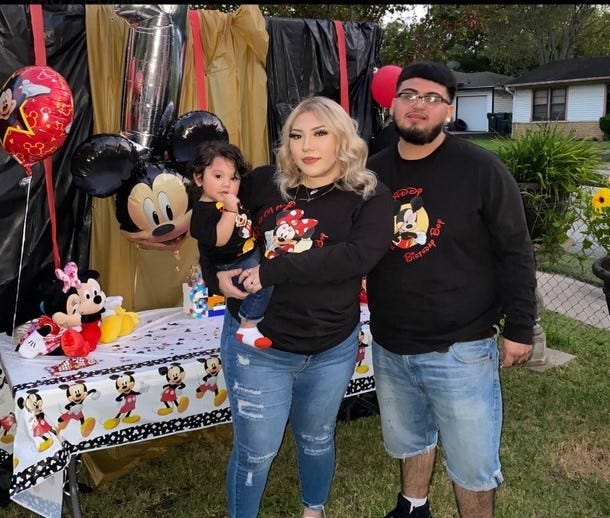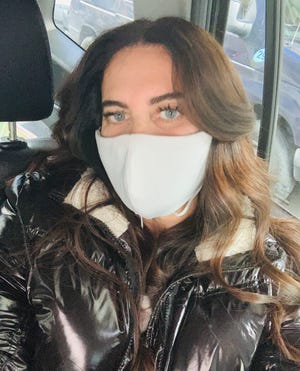Edelmira Rivera was lying on her bed with her husband and 16-month-old son selecting a movie when she heard a loud bang outside their home in Waco, Texas.
Then her sister screamed, “Fire!”
“I dropped everything and just grabbed my son and his blanket,” said Rivera, 22. “I could not smell anything. I was so shocked to see the fire at the front door.”
Rivera tested positive for COVID-19 and lost her sense of smell on Jan. 14. Early the next morning, a fire broke out on the other side of her bedroom wall, less than a foot from where she was lying. But Rivera couldn’t smell it, nor could the family of four who was staying with them.
Her sister, Bianca Rivera, 19, smelled something burning from the other side of the house, initially thinking her sister had burned popcorn in the kitchen. When she smelled burning plastic, Rivera walked out of her room and saw smoke in the hallway, quickly ushering seven people and three dogs out of the home before fire consumed it.

Like Rivera, millions of people worldwide have suffered changes to their sense of smell or taste after contracting COVID-19. In most cases, the symptoms usually only last a few weeks.
But a year into the pandemic, researchers still aren’t sure when some COVID-19 survivors may get their senses back – if ever – and many are struggling with the long-term safety, hygiene and psychiatric implications of the loss.
“As the pandemic has rolled on, we’ve gotten a better idea about the long-term, chronic effects of COVID on smell and taste,” said Dr. Jay Piccirillo, an ENT and professor at the Washington University School of Medicine who studies the topic. “The things we’ve learned suggest that most people recover smell and taste, but not all.”
A million new survivors with chronically diminished senses?
In the coming year, there will be at least a million new cases of people in the U.S. with chronically diminished senses of smell or taste due to COVID-19, Piccirillo predicts.
Studies suggest up to 80% of people who have COVID-19 symptoms experience smell or taste dysfunction, with a significant association between the two senses. Some experience reduced ability to smell or taste. Some have a complete loss. And some experience distorted senses, where certain tastes and smells change or become unpleasant – an increasingly common outcome, called “parosmia.”
Dr. Evan Reiter, an ENT and professor at Virginia Commonwealth University who studies the issue, said he’s seeing similar rates of patients reporting dysfunction with smell as with taste.
Fact check:Burnt oranges, brown sugar won’t restore senses lost to COVID-19
“In general, anytime you’re eating something, it hits the taste buds in your mouth, and you’re smelling the vapors in your food at the same time, so you brain puts it all together to determine how you perceive the taste of food,” Reiter said.
Most people regain their senses within a few weeks, but approximately 5-10% will continue to have symptoms after six months, Piccirillo said. At that point, they may not ever return, he said.
Scientists have known since the early days of the pandemic that smell-taste disturbance is associated with milder cases of COVID-19, and with cases in younger people. A study published earlier this month in the Journal of Internal Medicine reinforced the conclusions.
Sniffing out COVID-19:Ohio State study proposes using hard candy to test for symptoms
Among more than 2,500 COVID-19 patients at 18 European hospitals in the study, more than 74% self-reported a distorted sense of smell and 46% a distorted sense of taste. The vast majority of both categories were younger patients and those with milder cases.
The good news is that more than half of the patients with smell distortions saw their symptoms disappear within a month, rising to 95% of patients by six months, according to the study. For those remaining 5%, the future remains unclear.
Dr. Pam Dalton, a researcher at the Monell Chemical Senses Center in Philadelphia, said patients should not give up hope. Some people who have lost their sense of smell due to rhinoviruses, which cause common colds, have regained the sense after several years, she said.
“There is evidence from other viruses that may disrupt the system in different ways that recovery can occur after six months,” Dalton said. “There isn’t a cut-off beyond which all hope should be abandoned.”
‘It can be depressing and upsetting’
Loss of smell or taste can have a severe impact on quality of life and make it harder to identify dangers in the environment, such as gas leaks or spoiled food, experts say. For professions that rely on the senses, loss of smell or taste can be career-ending. It can alter relationships, degrade mental health and result in severe weight loss or gain.
New York City resident Lyss Stern, 46, said she’s gained 30 pounds since she lost her senses of smell and taste in late March, when she had a mild case of COVID-19 for six weeks. She’s too fatigued to exercise, and she eats a lot of carbs because she likes the way they feel in her mouth.
Tracking COVID-19 vaccine distribution by state:How many people have been vaccinated in the US?

Stern said she has identified a dozen foods that she can still taste, and she goes to the same pickle shop every week to stock up on a variety of flavors. Last month, Stern smelled an orange again for the first time and started crying. And a few weeks ago, she got a whiff of a cookie when she walked past a bakery.
“It can be depressing and upsetting,” Stern said. “Everything to me just tastes gross. But I’m not going to let that get me down – now or ever. I’m here. So many people didn’t survive this beast.”
Stern said her family is in the process of moving apartments, and she plans to set up smoke and gas detectors in the new home right away. “It’s very scary,” Stern said. “If there’s a leak, I can’t smell it.”
Many patients who lose their sense of smell or taste also struggle with social anxiety and hygiene concerns, experts said. Piccirillo said parents often report wishing they knew when their child’s diaper needed to be changed – and when they may unknowingly be subjecting friends or family to a foul smell.
“People will report never wearing an item of clothing more than once because they’re afraid it might smell of their body odor and they can’t detect it. And the same thing goes with a lot of different social interactions,” Dalton said.
Gail Pav, 53, of Long Beach, Mississippi, has to ask her husband to taste-test their meals and let her know when there’s something smelly in the trash can. She had a mild case of COVID-19 in September – a stuffy nose for a few days, but never a fever. Ever since, her senses have been off.
“This week, the coffee was tasting funny. I’ve been having some really weird smells going on, like fuel. It’s so weird,” said Pav, who still wears perfume every day. “I’ve got a new grandbaby, and I just want to be able to smell Stella.”

For some COVID-19 survivors, the loss of smell or taste can be “crippling,” Piccirillo said. “With all the quality of life problems (during the pandemic), to now be isolated by sense of smell, or worse, distortion – it’s very sad,” he said.
Dr. Simone Wildes, an infectious disease physician at South Shore Health in Massachusetts, said it’s frustrating that there are “no specific therapies or more supportive advice” that she can give to patients. Many of her patients with loss of smell or taste have turned to online support groups.
With increasing reports of more transmissible coronavirus variants, Wildes said she’s worried greater spread may result in more cases with loss of smell or taste.
“It does not have to be deadly for you to end up with something very distressing in your life,” Wildes said. “For some people it’s temporary, but for some, it may be permanent.”

A ‘tidal wave’ of trial participants
Research into how the coronavirus disrupts senses of taste and smell is ongoing. In July, dozens of researchers published a paper suggesting the coronavirus changes the sense of smell in patients not by directly infecting smell-detecting neurons but by affecting the function of supporting cells.
Now, researchers are beginning to look at human autopsy data to assess the initial theory, said Dr. Sandeep Robert Datta, a professor of neurobiology at Harvard Medical School and one of the study co-authors. Data available so far is “broadly consistent” with the hypothesis, Datta said, but he’s keeping an open mind.
“Never before in recent medical history have there been so many people who have lost their sense of smell or lost taste for this period of time,” Datta said. “We need to make a serious basic science effort to help physicians deal with the patients who are flooding their offices.”
Other researchers are looking into whether the coronavirus attacks the taste system independently of the smell system.
Are patients losing taste as a direct result of smell loss? Or are they also losing chemical sensitivity in their mouths? Valentina Parma, a researcher at Temple University who studies the senses of smell and taste, said that, for now, “the jury is still out” on what mechanism is affecting taste in patients with COVID-19.
The science behind smell loss:Why do so many COVID-19 patients lose their sense of smell? Scientists now know.
Treatment options for people with loss or distortion of smell or taste are limited, experts said. There’s some research on steroid and vitamin treatments. There’s also a long-used technique called olfactory training, where patients who have lost their sense of smell sniff various essential oils for a brief time each day for several weeks.
“For those patients who have (distortions of smell), we think it’s some sort of miswiring. When they see coffee, they small oranges,” Piccirillo said. “Through olfactory training, you can maybe rewire them. That’s the hypothesis.”
Piccirillo and his team are conducting an olfactory training trial with COVID-19 patients. The training traditionally features four scents: rose, lemon, clove and eucalyptus. For his trial, Piccirillo is allowing one group of participants to select their preferred scents to test if the approach is more effective with scents that are important to people.
“The No. 1 scent people want to train on? Smoke,” Piccirillo said. “It’s makes them so scared they can’t smell smoke or natural gas.”
Piccirillo and his team have seen a “tidal wave” of study participants. They’re also starting a clinical trial looking at the drug theophylline, a common asthma medicine.
Both Reiter and Dalton are working with their teams to track the recoveries of COVID-19 patients who have lost their sense of smell. Dalton’s team is also developing a smell screening test to identify people who may have COVID-19. They’re deploying the tests to drive-up clinics, as well as to Yale University, where some students are taking the smell test in addition to twice-weekly molecular tests.
“It’s really discouraging with so many people now suffering or who will be suffering,” Piccirillo said. “Any way you slice it, this is a big problem, and presents a real challenge to the scientific community to start finding some effective treatment options for people.”

Bianca Rivera, who got her family and friends out of the house fire, still doesn’t know why she never contracted COVID-19, even after extended exposure to her family and friends when they moved into hotel rooms together after the blaze.
Her sister, Edelmira, regained her sense of smell a few days after the fire, which is under investigation. The family is planning to rebuild their home and install smoke detectors.
“Losing all my shoes, clothes – none of that matters to me. It can be replaced. Not having a home for my son … I’m grateful that I still have him. I’m still alive to see him grow,” she said.
Rivera said she was initially “skeptical” about COVID-19.
“I thought it was a hoax. I thought it was fake. But actually going through it and losing my smell, it’s scary,” she said. “So take it as a reminder to take care of your home, and to take care of yourself.”
Follow breaking news reporter Grace Hauck on Twitter at @grace_hauck.
